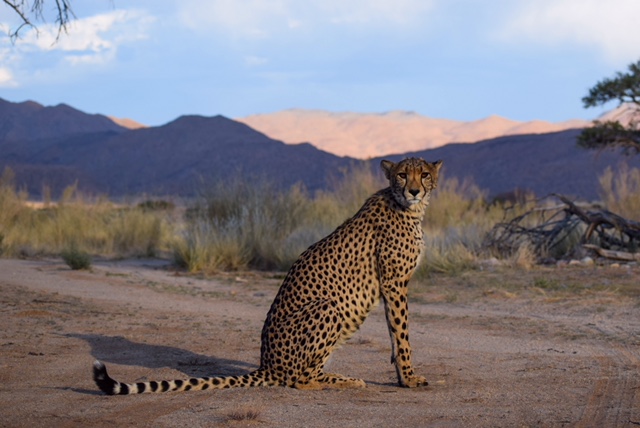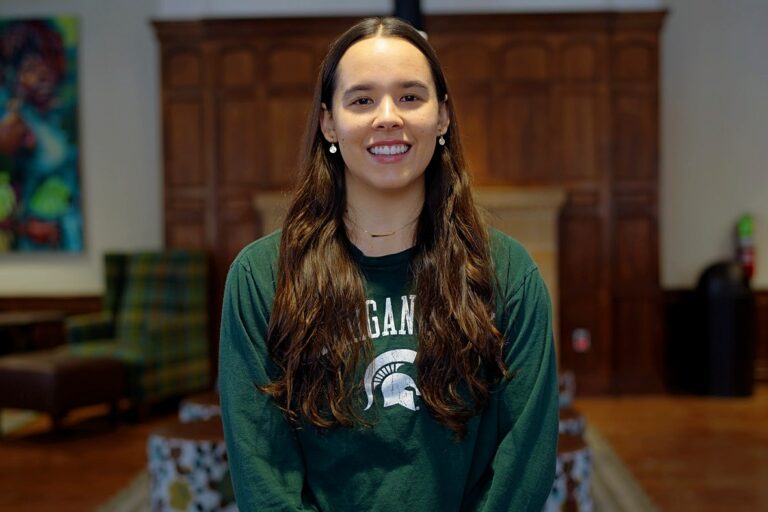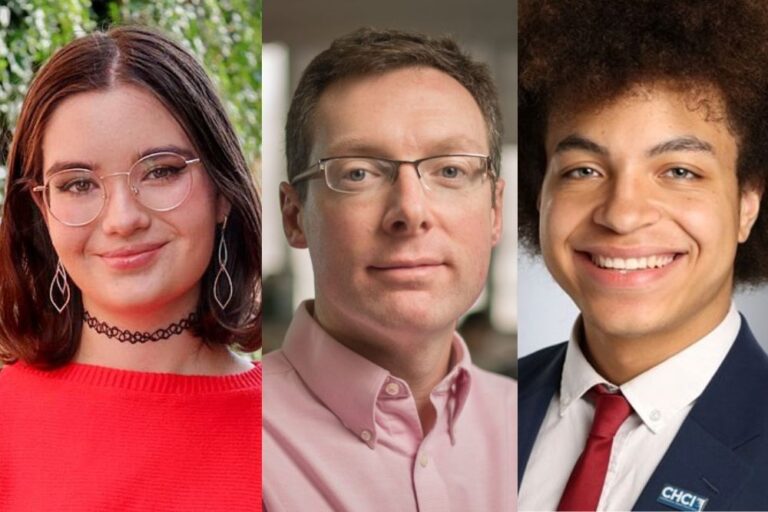
MSU alumna Kelsey Prediger works with cheetahs in Namibia, Africa, as the Conservation and Tour Manager of the Solitaire Activity Centre for the Solitaire Land Trust. Prediger graduated from Michigan State University in 2013 with a Bachelor of Arts degree in German and a Bachelor of Science degree in Zoology and Environmental Biology. We recently caught up with Prediger and asked about her career, MSU experiences, and any advice she has for current students.
What are the responsibilities of your current position?
I am responsible for managing the care and husbandry of a small cheetah sanctuary including acting as a para-vet because we only have a veterinarian on call for emergencies who is located more than a three-hour drive away. In essence, I am the curator for the sanctuary.
I also facilitate the conservation work on the property to restore the reserve to its natural state after being a commercial farm for many years. To monitor wildlife, I use camera traps and game counts to collect data on populations and species diversity.
For the tourism side of things, I do everything from arranging nature drives and cheetah sanctuary visits to mapping new hiking and biking trails. I have a small number of staff who help with the educational tours, but as we are very busy, I often am doing them as well.
The property includes two lodges, a restaurant, a bakery, a petrol station, and a general dealer of which I also must help with managerial duties. I don’t have an administrative assistant, so I am often tied up with emails, phone calls, accounting, and reports for the Activity Centre. I also am developing an education center focused on conservation for the tourists to get a better understanding of Namibian wildlife.
How did your MSU education help prepare you for your career?
MSU was a great multicultural environment where I could study alongside people of different backgrounds and perspectives. This environment, combined with my international studies, helped prepare me to jump head first into a completely different culture and work environment. It also has helped keep me open-minded and look at situations from many different perspectives. I find that to be a very important aspect to have developed for a career where you must always be on your toes and ready to quickly adapt to new environments and problem-solve under stress.
I also find that the flexibility in learning methods and application between studies in science and arts/language is a huge contribution to my ability to adapt to new situations quickly. Anyone who has worked with animals would understand that you must have plans A-Z (or more) because wild animals cannot be predicted and always have a plan of their own.

I studied zoology as my career choice because of my love for nature (big cats especially) and German as a passion having grown up with an Oma (German grandma) and visiting my family abroad every few years.
I always had dreams that one day I would live in Germany to improve my language, but I always wondered how I could tie it in with my career. I never imagined that one day I would find a place where both worlds of my German heritage and passion for wildlife conservation of large carnivores would collide.
Here in Namibia, that has happened, and my studies at MSU gave me the perfect background for it. I get to use the German I learned at MSU while interacting with Namibians on various topics as well as practice my zoological vocabulary giving educational tours to German tourists visiting Namibia.
Did you have any internships, study away, or study abroad programs that influenced your career and/or life?
I don’t know if I can answer this without needing an entire page! I would say every single internship and study abroad program I completed has led me to the place I am in my career today. I have interned in zoos, sanctuaries, conservation programs, and more. Through each experience, I was able to get closer to doing the work that I dreamed of — working closely with large carnivores and conservation.
I also did a study abroad program to Germany, German Language and Culture in Mayen. This influenced me to pursue a Bachelor of Arts in German as opposed to simply a minor. It was a huge step in fully embracing and pursuing my interest in German language and culture.
I never imagined that one day I would find a place where both worlds of my German heritage and passion for wildlife conservation of large carnivores would collide.
Did you have any mentors at MSU and how did they help you in your career?
I had many mentors and professors that supported and motivated me. It is hard to mention everyone and in every way. Overall, I would like to thank all my German professors, aka the German Department, for always helping me see the value of progressing my language as well as backing the German Club (which I was President of) to constantly reach for higher goals and new accomplishments.
Tom Lovik always made situations and studies relatable in class and on our study abroad program in Mayen. He put up with all our shenanigans with a smile on his face and eager to teach us no matter which level we were at. Senta Goertler, Elizabeth Mittman, George Peters, and David Kim – It is because of all of these people that I went from wanting to take a couple of German classes to a full bachelor’s degree in German language.
What should students take advantage of while they attend MSU?
Take advantage of the community and student clubs/groups. Once you enter the workforce, you can find these connections and friends to be a huge support. You may even find each other in opposite ends of the world providing opportunities for one another.
After graduation, depending on where you relocate to, it can be very hard to find people who are interested in the same things you are. I was a member of the German Club and Zoology Club. Through both opportunities, I was involved in so many neat events and activities related to my interests while making lasting friends.
Since leaving MSU, I have lived in some wild, remote places of the world where you can’t even find one relatable person. It helps to reach out to the Spartan alumni community to see how they are doing things in their career compared to where you are. It is also great to have these Spartans spread across the world that you can connect with.

What advice do you have for new graduates entering the workforce?
As the workforce becomes more saturated with qualified people, getting the dream job you desire may become further out of reach and much more competitive. I can’t tell you how many applications I put in after college and was rarely even offered an interview despite having multiple internships and full-time working experience.
I would be bartending and people would ask me, “what are you going to do after you graduate?” I would tell them, “I am going to work with big cats in Africa.” I didn’t always have faith in it, but I finally started getting feedback and followed the doors that opened and that got me to where I am today.
Don’t ever let these things discourage you. If you continue to pursue what you are passionate about, things will fall into place. Be persistent and show your passion. Experience can be more important than your degree sometimes, so always stay involved with your career choice, even if you are just volunteering. Having that on your resume looks like true dedication to a prospective employer.
Is there anything you’d like to add about MSU and your time on campus?
I truly miss the supportive community that MSU has. You can always find new and exciting opportunities to be involved with. It was a fantastic place to learn and grow into a leader. I must say, once a Spartan always a Spartan! It is always an amazing feeling of community to meet Spartans around the world, and just because you have your alma mater in common, you feel like you are already friends.


